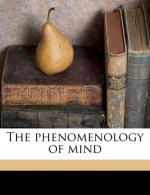
|
| Name: _________________________ | Period: ___________________ |
This test consists of 5 multiple choice questions, 5 short answer questions, and 10 short essay questions.
Multiple Choice Questions
1. According to Hegel, why is the self unhappy?
(a) Because it can never contact its unconscious sources.
(b) Because it will always be torn between the present contingency and infant perfection.
(c) Because it can imagine fulfillment but never know it completely.
(d) Because it can imagine eternity, but has to die.
2. What does Hegel say we have to see in order to understand the truth about a thing?
(a) The reality that perception is subjective and relative.
(b) The possibility that there can be more than one thing at a time.
(c) The notion that things continue to exist regardless of our presence or absence.
(d) The possibility of there being something more than the thing itself.
3. What does Hegel say is impossible in animal life?
(a) Individuality.
(b) Purposeless behavior.
(c) Consciousness.
(d) Randomness.
4. What is it that expresses both the individual and inner reality, in Hegel's view?
(a) Conflict within the self.
(b) Physical form.
(c) Action.
(d) Self-reflection.
5. In Hegel's terminology, what does the term "sensibility" pertain to?
(a) A physiological apparatus for perception.
(b) A zeitgeist, a spirit of the times.
(c) An entity whose end is itself.
(d) A mental construct that organizes sensations.
Short Answer Questions
1. According to Hegel, action turns the external world into an arena where what can come into being?
2. What field does Hegel defend in the Preface and Introduction?
3. What does Hegel mean by "concrete"?
4. How does the double consciousness unify according to Hegel's philosophy?
5. In what way could Hegel see a person, a table and a fruit as all identical?
Short Essay Questions
1. How does Hegel define determinateness?
2. What is the difference between "theoretical reason" and "practical reason" in Hegel's terminology?
3. How does Hegel define "sensibility"?
4. What is the relationship of freedom and fate in Hegel's terminology?
5. How does Hegel define hedonism?
6. Why does Hegel describe consciousness as unhappy?
7. How does Hegel define Reason?
8. What was the relationship between philosophy and science in Hegel's time?
9. How are notions and reality related according to Hegel's philosophy?
10. What obstacle is there, in Hegel's terminology, to an individual following the law of the heart?
|
This section contains 740 words (approx. 3 pages at 300 words per page) |

|




